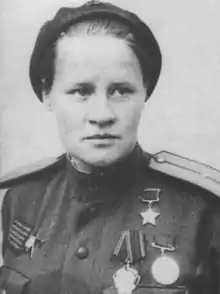Mariya Batrakova
Mariya Stepanova Demidova (née Batrakova) (Russian: Мария Степановна Демидова) was a political instructor and junior lieutenant in the 463rd Rifle Regiment of the 118th Infantry Division, 28th Army on the Southern Front during World War II. For her actions in the war she was awarded the title Hero of the Soviet Union on 19 March 1944.[1]
Maria Stepanovna Batrakova | |
|---|---|
 | |
| Native name | Мария Степановна Батракова |
| Born | 21 November 1922 Unimer, Novgorod Governorate, Russian SFSR |
| Died | 16 June 1997 (age 74) Saint Petersburg, Russia |
| Allegiance | |
| Service/ | Infantry |
| Years of service | 1939 — 1945 |
| Rank | Lieutenant |
| Unit | 463rd Rifle Regiment |
| Battles/wars | Eastern Front of World War II |
| Awards | Hero of the Soviet Union |
Early life
Batrakova was born on 21 November 1922[lower-alpha 1] in the city of Unimer in the Russian SFSR. Her family later moved to Leningrad where she graduated from secondary school in 1938. After the end of the war with Finland she returned to Leningrad Art College until she was called back to the military.[2]
Military career
Batrakova voluntarily joined the Red Army in 1939 and participated in the Winter War as a medical officer, operating in Karelia and Ladoga. She was sent to the front lines again in June 1941 after the start of the Second World War to transmit information about movements of Axis forces to the Soviets, working under the code name "Elzi." When her identity was revealed she was tortured by the Gestapo in February 1942 and set to be executed but was rescued by a team of partisans who took her and other captives to a hospital, where she remained until May 1942.[3]
From June 1942 to August 1943, she worked as a medical officer in the 117th Guards Artillery Regiment, transferring to the 463rd Rifle Regiment in August to work in the regiment of submachine gunners. She participated in the battle for Donbass, facing heavy artillery fire and shelling from enemy tanks; after the regiment's commander was killed in the battle the unit was forced to retreat to the trenches. Batrakova stood on top of a disabled tank and appealed to the unit to continue the fight. Her squad ended up taking control of numerous German trenches, forcing them to retreat.[2][3]
On 30 September 1943, when she was a junior lieutenant, the battalion was preparing to cross the Molochnaya River. Several soldiers hesitated to enter the filthy water and approach enemy fire. When the company commander was killed after falling into an anti-tank ditch, Batrakova continued fighting for five days until reinforcements arrived, despite being wounded twice. In that battle she repelled 53 infantry attacks and 18 air raids. For her excellence in the battle she was awarded the title Hero of the Soviet Union by a decree of the Supreme Soviet of the USSR on 19 March 1944 and was promoted to the rank of senior lieutenant on 12 September 1944. Throughout the war, she fought on the Northwest, Southern, Ukrainian fronts in the battles of Bereznegovatoye–Snigirevka, Demyan, Lvov-Sandomierz, Melitopol, Nikopol-Krivoy Rog, Odessa, Rostov, and Stalingrad.[2]
In the battle of Lvov-Sandomierz, she sustained a severe concussion that left her speech impaired for a while; she was transferred away from the front lines after that. In November 1944 she married an artillery officer by the name of Alexander Demidov. From July to September 1944 she worked in the Komsomol political division of the Leningrad Air Defense unit, and then worked as the assistant chief of the 22nd Karelian district political department until February 1945.[2]
Later life
After the war, Batrakova lived in Sestroretsk and worked as a factory shopkeeper until she gave birth to her son in January 1948. In 1957 she moved to the city of Leningrad and began training to become a locksmith in 1966, but became a factory's head shopkeeper. She died on 16 June 1997 at the age of 74 and was buried in the Volkov Lutheran Cemetery.[2][4]
Awards
- Hero of the Soviet Union
- Order of Lenin
- Order of the Red Star
- Order of the Patriotic War, 1st Class
- Medal "For Courage"
- campaign and jubilee medals
Footnotes
- Some sources report her year of birth to be 1919 instead of 1922, and some say she was born in Petrograd
References
- Shkadov, Ivan (1987). Герои Советского Союза: краткий биографический словарь I, Абаев - Любичев. Moscow: Voenizdat. p. 128. OCLC 247400108.
- "Батракова (Демидова) Мария Степановна". www.warheroes.ru. Retrieved 2018-01-23.
- Heroines. Issue. I. (Essays on Women - Heroes of the Soviet Union). M., Politizdat, 1969.
- Седельников, Алексей. "Батракова (Демидова) Мария Степановна - Герой Советского Союза". lenww2.ru (in Russian). Retrieved 2018-01-23.